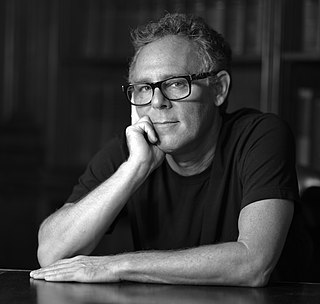A Quote by Charlie Kaufman
There is a lot of management going on with directing. Maybe that was the biggest surprise-just the amount of tending that I had to do. The different personalities . . . It's not my way, and it's never been my function before as a writer. I tend to be a moody and somewhat withdrawn person, and I felt very clearly that I had to throw that away because that wasn't allowed here - there were other people who were going to be filling that role. Sometimes it became exhausting, especially around the eleventh hour of the day.
Quote Topics
Allowed
Amount
Around
Away
Became
Because
Been
Before
Biggest
Biggest Surprise
Clearly
Day
Different
Different Person
Different Personalities
Directing
Eleventh Hour
Exhausting
Felt
Filling
Function
Going
Had
Hour
Just
Lot
Management
Maybe
Moody
My Way
Never
Other
People
Person
Personalities
Role
Sometimes
Somewhat
Surprise
Tend
Tending
Throw
Very
Way
Were
Writer
Related Quotes
All the people of all the nations which had fought in the First World War were silent during the eleventh minute of the eleventh hour of Armistice Day, which was the eleventh day of the eleventh month. It was during that minute in nineteen hundred and eighteen, that millions upon millions of human beings stopped butchering one another. I have talked to old men who were on battlefields during that minute. They have told me in one way or another that the sudden silence was the Voice of God. So we still have among us some men who can remember when God spoke clearly to mankind.
The lonely reality of the truth-that the most important person in your life suddenly ceased to exist. Which on a bad day meant maybe she had never existed at all. And on a good day, there was the other fear. That even if you were a hundred percent sure she had been there, maybe you were the only one who cared or remembered.
When we started on 'Coraline,' there was a whole host of things that we had no idea how we were going to do. Because we were making films in a way that had never really been done before, we were taking this hundred-year-old art form and bringing it into a new era by embracing technology and innovation.
I mean, when I got to Brown, the place was riven, because you had older professors who were basically new critics and had been teaching a certain way for 30 years. And then you had this other gang who was down with the semiotic program. And as a student, you were, in a way, forced to choose which cohort you were going with.
For me, the ages between 9 and 12 were great because it was before you wore any masks, and you had some autonomy in the world. You had some freedom, and you felt you had unlimited ambition. It's when you thought, 'I'm going to write plays. I'm going to be president. I'm going to do this; I'm going to do that.' And then it all falls apart.
What if I had been born during a war and I lived in an occupied city, and people were being taken out and shot every day? Everything would be different - even after the war ended, my future would be very different. Look at what these poor people in Aleppo are going through. The children, the ones who survive, are going to be absolutely altered by what they live through, and you and I, luckily, have never had to deal with that.
We've had one of these before, when the dot-com bubble burst. What I told our company was that we were just going to invest our way through the downturn, that we weren't going to lay off people, that we'd taken a tremendous amount of effort to get them into Apple in the first place; the last thing we were going to do is lay them off.
With Pussy Riot - this was a prank! It was a brilliant, artistically gifted prank. But they didn't expect to go to prison! They were college girls who became political prisoners for two years. That makes them very similar to the people who were "just going to a protest one day" and got arrested. They had no idea they were risking the rest of their lives. Because you're never the same after you've spent two years in a gulag.
I, who cannot stay in my chamber for a single day without acquiring some rust, and when sometimes I have stolen forth for a walk at the eleventh hour of four o'clock in the afternoon, too late to redeem the day, when the shades of night were already beginning to be mingled with the daylight, have felt as if I had committed some sin to be atoned for.
I had not been involved in any way in planning the event in Mobile. My staff maybe, had really been contacted, but I had never talked to Donald Trump about him coming to Mobile, and I decided - I had something else to do but it became so clear that it was going to be such a big event that I should be there. And he had already adopted my immigration views, in large part, and he was saying things I thought were valuable, about immigration.
I have one quote I very often read to myself, from a very good friend: 'Forget the people around you now; remember the little boy who was racing in go-karts, what you were dreaming of and what he wanted to achieve one day and what was his goal. Race for him.'. I fell in love with the sport, I love racing. The amount of satisfaction I get just going around in a Formula 1 car makes me smile. So if it is a bad day then you tend to come out and say it's horrible and you don't enjoy. But if you had to pick between that and doing nothing, you would always pick that.
If I had been a different sort of person, maybe less impressionable, less intense, less fearful, less utterly dependent upon the perceptions of others - maybe then I would not have bought the cultural party line that thinness is the be-all and end-all of goals. Maybe if my family had not been in utter chaos most of the time, maybe if my parents were a little better at dealing with their own lives maybe if I'd gotten help sooner, or if I'd gotten different help, maybe if I didn't so fiercely cherish my secret, or if I were not such a good liar, or were not quite so empty inside... maybe.
The late '90s were a really bad time for people trying to be rock stars, you know what I mean? It seemed like everyone was a one-hit wonder on the radio. We had friends who had a hit single on the radio and sold 500,000 records, and then they couldn't get arrested a year later. I had this feeling at the time that that was not possible anymore, so the idea of becoming the biggest band in the country—it seemed laughable. I felt that having those sort of ambitions was foolish, because there was no way that was going to be possible. If you saw it that way, you were just deluding yourself.
I wasn't allowed to throw big hooks and overhand rights until I'd been striking for three years. It's so you don't rely on those things from the very beginning. If your footwork sucks, and you can only stand in one place and throw your hands all crazy while the other person is running around, you're never going to be able to hit them.







































